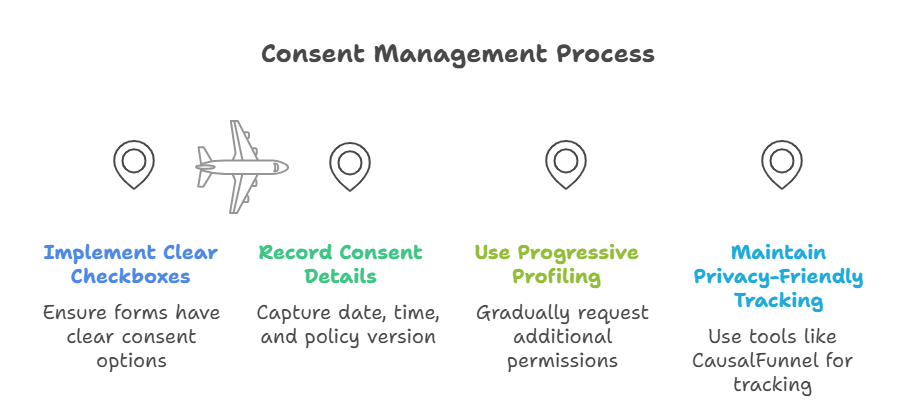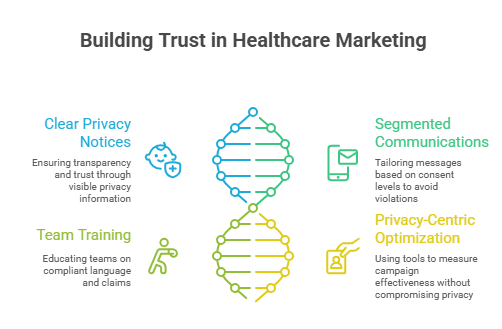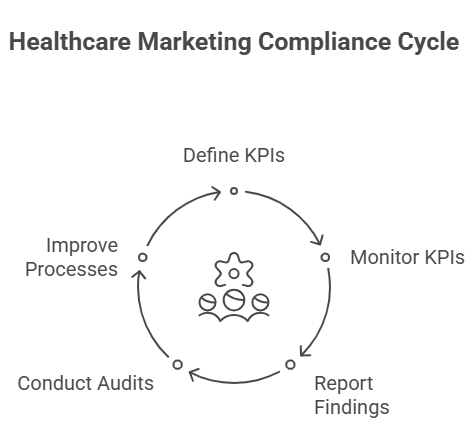How can healthcare marketers generate leads without risking costly compliance mistakes?
With regulations like HIPAA, GDPR, and new laws emerging, following the rules is no longer optional; it is essential. Ignoring compliance in healthcare lead generation can lead to heavy fines and damage to your company’s reputation.
This blog will explore practical strategies to build lead generation processes that put compliance first. Along the way, it will show how tools like CausalFunnel can help automate tracking and keep your campaigns on the right side of the law while still driving strong results.
Before you can make your lead generation compliant, you have to understand where and how you collect data. This means taking a full inventory of every place you gather personal health information (PHI) and business contact details.
These can include website forms, sign-up widgets, download pages, and chatbots. Knowing exactly where data enters your system is the first step toward protecting it properly.
Mapping Data Flows
Once you know where data is collected, map out how it travels through your systems. Every form and widget should connect clearly to its destinations, such as your CRM, marketing automation tools, or analytics platforms. This map helps you see the full path data takes and identify any hidden or unexpected connections. Understanding these flows reduces the chance of data leaks or mishandling.
Finding Gaps in Security and Consent
With your data map in hand, look for weak points that could cause compliance problems. Are data transmissions encrypted to prevent eavesdropping? Do all forms ask for clear consent before gathering information?
Are you collecting only what’s necessary, or is there extra data that increases risk? Identifying gaps in encryption, consent capture, and data minimization is critical for closing compliance holes and building trust with prospects.
Completing a thorough audit of your data collection lays the foundation for a compliance-first lead generation approach. It lets you act confidently knowing where your risks lie and how to fix them.
Managing consent is essential for healthcare marketers who want to stay compliant while building trust with prospects. Consent must be clear, explicit, and recorded properly from the moment data is collected.

Use Explicit Consent Checkboxes
Make sure every form, sign-up, or lead capture point includes clear checkboxes for different marketing uses. These should cover emails, phone calls, and any sharing with third parties. Tell prospects exactly what they are consenting to using simple, easy-to-understand language. Consent should never be assumed or hidden in fine print.
Record Consent Details for Transparency
Capture the date and time when consent is given, along with the version of your privacy policy that was active. Store this information securely in your CRM or database. This data is crucial for audits and proving compliance when regulators ask for it. Keeping detailed consent logs protects your business and shows respect for prospects.
Use Progressive Profiling for Additional Permissions
Rather than asking for all permissions upfront, introduce requests gradually as prospects move through the sales funnel. For example, initial consent may cover newsletter emails, while later stages might request permission for phone calls or more personalized outreach. This approach reduces friction and increases the likelihood of obtaining genuine consent.
How CausalFunnel Supports Privacy-Friendly Tracking?
While consent management itself requires specialized tools, platforms like CausalFunnel help maintain clear visibility into the customer journey without relying on intrusive cookies. CausalFunnel’s privacy-conscious tracking can link user behavior across sessions while respecting evolving consent states. This ensures your funnel analytics stay accurate even as prospects adjust their preferences or opt out, supporting compliance without sacrificing insight.
By building a consent system that is clear, well-documented, and responsive to prospect preferences, healthcare marketers can gain trust, avoid penalties, and enable HIPAA compliant healthcare marketing that truly respects privacy.
Keeping healthcare lead data safe is non-negotiable. You need solid security measures to protect sensitive information from unauthorized access and cyber threats. This starts with strong encryption and continues with strict access controls and ongoing audits.
Encrypt Data Both at Rest and in Transit
Encryption scrambles data so only authorized users can read it. Encrypt data stored on servers or devices, known as encryption at rest, to shield it from theft or loss. Use advanced standards like AES 256-bit encryption, widely trusted for healthcare data security.
Also, encrypt data as it moves between systems, called encryption in transit. Protocols like TLS 1.2 or 1.3 secure data sent over networks, such as between your CRM and marketing platforms. Encrypting journey touchpoints prevents hackers from intercepting sensitive information.
Control Who Has Access
Limit data access using role-based permissions. Each team member or system should only have access to the information necessary for their role. Combine this with two-factor authentication to add a strong security layer. Even if login credentials are compromised, two-factor authentication prevents unauthorized entry by requiring a second verification step.
Regularly Audit Third-Party Integrations
Your funnel likely uses many tools such as CRMs, marketing automation, and analytics platforms. Regularly review these vendors for compliance certifications and evidence of secure data handling. A tool breach anywhere in your system can put your entire data environment at risk. Conduct annual security assessments and maintain business associate agreements with all partners involving health data.
By putting encryption at the core, applying strict access controls, and regularly auditing your ecosystem, you safeguard patient and prospect information and meet evolving healthcare compliance standards with confidence.
Effective communication in healthcare marketing requires more than just creative messaging. It must fully respect compliance rules around privacy and consent, ensuring your prospects feel safe and valued.

Clear Privacy Notices and Opt-Out Options
Every email and landing page should include clearly visible privacy notices informing recipients how their data will be used. Make opting out easy and prominent. This transparency builds trust and helps avoid complaints or legal issues. Simple language is key, so everyone understands their choices.
Segment Communications by Consent Level
Not all subscribers give the same level of consent. Segment your email lists so you only send certain types of messages to those who have agreed explicitly. For example, only contacts who consented to marketing calls should receive phone outreach. This reduces mistakes and keeps your marketing compliant with regulations like HIPAA and GDPR.
Train Your Teams on Compliant Language and Claims
Marketing and sales teams need ongoing training on what they can say and claim in healthcare communications. Avoid guarantees or unproven claims about treatments or products. Use precise language backed by data and approved by legal if needed. This protects your brand and ensures you deliver honest information.
Use Privacy-Centric Conversion Optimization
Tracking campaign effectiveness while respecting privacy is possible with advanced tools designed for healthcare marketing. Conversion optimization platforms with privacy-focused reporting help you measure what content and offers work best without exposing personal health information. These insights guide your strategy to improve campaign impact safely and compliantly.
Carefully made compliant messaging combined with the right tools creates marketing that connects authentically while safeguarding trust and meeting healthcare requirements. This approach is at the heart of compliant lead gen strategies healthcare professionals can rely on.
Staying compliant in healthcare marketing is not a one-time task. It requires ongoing monitoring, reporting, and improvement. By tracking key performance indicators or KPIs, you can measure how well your compliance efforts are working and identify areas that need attention.

Define Key Compliance KPIs
Start by choosing important KPIs such as consent collection rates, the number of data breach incidents, and results from internal audits. These metrics provide a clear picture of how well your organization respects privacy and follows rules. Tracking consent rates ensures you know how many prospects have given permission for outreach. Incident reporting helps you quickly detect and resolve any security or privacy issues.
Use Real-Time Dashboards
Bring compliance data into dashboards that your legal, marketing, and executive teams can access anytime. Real-time visibility makes it easier to spot trends and act promptly. Custom dashboards can show compliance status in formats tailored to different audiences, helping ensure everyone stays informed and accountable.
Schedule Regular Audits and Reviews
Plan quarterly or semi-annual audits and tabletop exercises to evaluate policies and processes. This keeps compliance top of mind and helps adapt to new regulations. Audits reveal gaps before they cause serious problems, allowing your team to fix issues proactively.
Leverage Privacy-Aware Funnel Analytics
Some funnel analytics tools provide privacy-focused tracking that respects regulatory boundaries while offering detailed user journey insights. These platforms help you monitor funnel health and compliance risks without relying on cookies or personal identifiers. Using such analytics can improve your ability to protect data while optimizing marketing.
By measuring compliance with clear KPIs, maintaining accessible reports, and regularly reviewing procedures, healthcare marketers can ensure ongoing adherence to legal and ethical standards while continuously improving performance.
Embedding compliance deeply into your healthcare lead generation protects your business and builds trust with prospects. Applying proven strategies ensures your marketing respects privacy rules while driving results.
Using privacy-conscious analytics supports better control over your funnel’s performance without risking sensitive data. Platforms designed for compliance-aware tracking can help balance insights with safeguards.
Take the next step by adopting these best practices and exploring solutions like CausalFunnel, which combine intelligent funnel management with privacy protections. Try a free trial today to see how compliance and growth can go hand in hand.
Empowering businesses to optimize their conversion funnels with AI-driven insights and automation. Turn traffic into sales with our advanced attribution platform.



